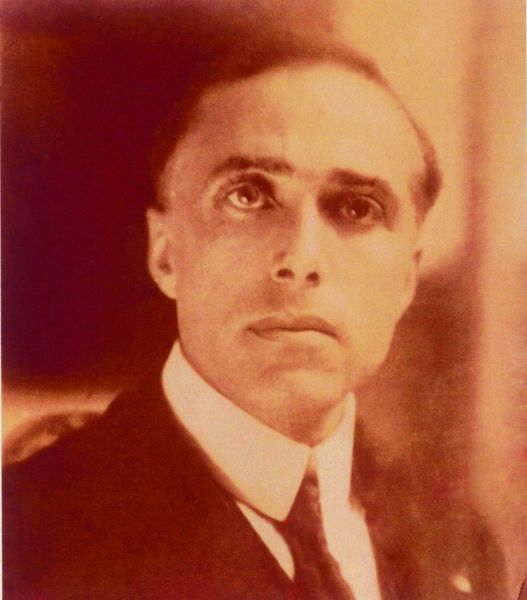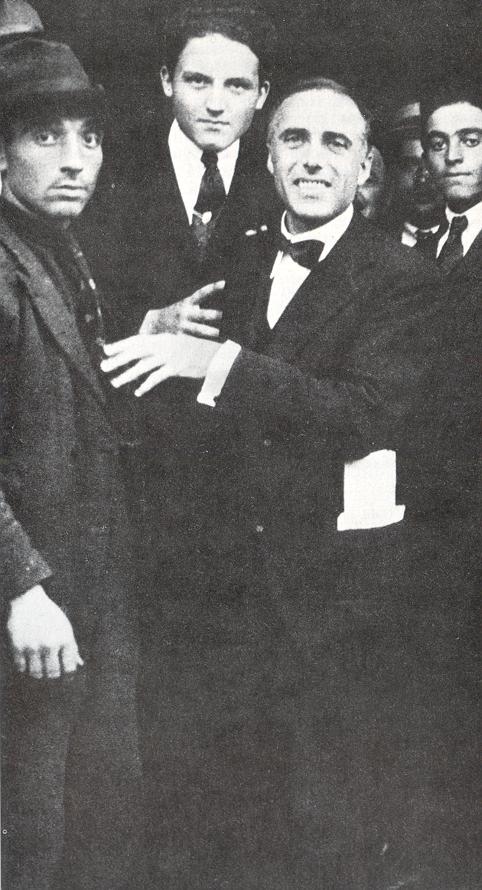<Back to Index>
- Physicist Yves André Rocard, 1903
- Composer Wilhelm Richard Wagner, 1813
- Politician Giacomo Matteotti, 1885


Giacomo Matteotti (22 May 1885 – 10 June 1924) was an Italian socialist politician. On 30 May 1924, he openly spoke in the Italian Parliament alleging the Fascists committed fraud in the recently held elections, and denounced the violence they used to gain votes. Eleven days later he was kidnapped and killed, allegedly by members or supporters of the National Fascist Party.
Matteotti was born a son of a wealthy family, in Fratta Polesine, Province of Rovigo (Veneto).
A graduate in law from the University of Bologna and from early on an activist in the socialist movement and the Italian Socialist Party, he opposed Italy's entry into World War I (and was interned in Sicily during the conflict for this reason).
He was elected deputy three times: in 1919, 1921 and 1924.
As a follower of Filippo Turati, Matteotti became the leader of the United Socialist Party in the Italian Chamber of Deputies after the scission of the Socialist Party. He openly spoke out against Fascism and Benito Mussolini, and for a time was leader of the opposition to the National Fascist Party (PNF). Since 1921 he denounced fascist violences in a pamphlet titled Inchiesta socialista sulle gesta dei fascisti in Italia. He was murdered on 10 June 1924, after the publication of his book The Fascisti Exposed: A Year of Fascist Domination and two fierce and lengthy speeches in the Chamber of Deputies denouncing Fascism. During
a kidnap attempt, he was bundled into a car and stabbed several times
with a carpenter's file as he was struggling to escape. His corpse was
found near Riano 20 miles from Rome, the 6th of August 1924, after an extensive search. Five men (Amerigo Dumini - a prominent member of the Fascist secret police, the Ceka,
Giuseppe Viola, Albino Volpi, Augusto Malacria and Amleto Poveromo)
were arrested few days after the kidnapping. Only three (Dumini, Volpi
and Poveromo) were convicted and shortly after released under amnesty by King Victor Emmanuel III;
one, Filippo Panzeri, escaped before the arrests of his accomplices.
Before the trial against the murderers, the High Court of the Senate
started a trial against general Emilio De Bono, commander of the MVSN, but he was discharged. After the Second World War, in 1947, the trial against Francesco Giunta, Cesare Rossi,
Dumini, Viola, Poveromo, Malacria, Filippelli and Panzeri was
re-opened. Dumini, Viola and Poveromo were sentenced to life
imprisonment. In none of these three trials was evidence found of Mussolini's involvement.
The involvement of Mussolini in the assassination is much debated.
Historians suggest some different theories. The main biographer of
Mussolini, Renzo De Felice, was convinced that the Duce was innocent. Even Aurelio Lepre and Emilio Gentile thought that Mussolini didn't want the death of Matteotti. The former socialist and anti-fascist journalist Carlo Silvestri in 1924 was a harsh accuser of Mussolini; later, when he joined Italian Social Republic, he affirmed that Mussolini showed him Matteotti Case's papers, and eventually he changed his mind.
Silvestri became a strong defender of Mussolini's innocence in
Matteotti's murder, and suggested that the socialist was killed by a
plot, in order both to damage Mussolini's attempt to raise a leftist
government (with the participation of Socialists and Popolari) and to
cover some scandals in which the Crown was involved. De
Felice argued that maybe Mussolini himself was a political victim of a
plot, and almost surely he was damaged by the crisis that followed the
murder. Many fascists left the Party, and his government was about to
collapse. Moreover, his secret attempt to bring Socialists and Populars
into a new reformist government was ruined. On the other hand, other historians of the time, including Justin Pollard and Denis Mack Smith,
thought Mussolini was probably aware of the assassination plot but that
it was ordered and organized by someone else. However, recent studies by Mauro Canali suggest
that Mussolini probably did order the murder, as Matteotti uncovered
and wanted to make public incriminating documents proving that
Mussolini and his associates sold to an American oil company (Sinclair Oil) exclusive rights to all Italian oil reserves. The death of Matteotti sparked widespread criticism of Fascism. A general strike was
threatened in retaliation. Since Mussolini's government did not
collapse and the King refused to dismiss him, all the anti-facists
(except for the Communist Party of Italy)
started to abandon the Chamber of Deputies. They retired on the
"Aventine Mount", like ancient Roman plebeians. They intended to force
the Crown to act against Mussolini, but on the contrary this
strengthened Mussolini. He, after a few weeks of confusion, gained a
favourable vote by the Senate of the Kingdom, and with a speech tried
to calm the climate. Despite
the pressures from opposition, Victor Emmanuel III refused to dismiss
Mussolini, since the Government was supported by a large majority of
the Chamber of Deputies and almost all the Senate of the Kingdom.
Moreover, he feared that compelling Mussolini to resign could be
considered a coup d'état, that eventually could lead to a civil war between the Army and the Blackshirts. But
during the Summer, the trial against Matteotti's alleged murders and
the discovery of the corpse of Matteotti once again spread rage against
Mussolini: newspapers attacked him and the fascists very fiercely. On September the 13th, a left-wing fascist deputy, Armando Casalini, was killed on a tramway as retaliation to Matteotti's murder by the anti-fascist Giovanni Corvi. During
the Autumn of 1924, the extremist-wing of the Fascist Party menaced
Mussolini by a coup, and dealt with him on the night of San Silvestro
of 1924. Mussolini devised a counter-manoeuvre, and on the 3rd of
January of 1925 he pronounced in a famous speech,
both attacking anti-fascists and confirming that he, and only he, was
the chief of the Fascism. He challenged the anti-fascists to prosecute
him, and claimed both proudly that Fascism was the "superb passion of
the best youth of Italy" and grimly that "all the violences" was under
his responsibility, because he created the climate of violence "with a
propaganda from the intervention" to the 1924. Mussolini concluded with
a menace: Italy needs "tranquillity" and Fascism would assure
tranquillity to Italy in any manner. This speech is considered the very beginning of the dictatorship in Italy.
Matteotti's son, Matteo Matteotti,
became a Social Democratic parliamentary deputy after World War II,
serving as Italy's minister of tourism in 1970-72 and minister of
foreign trade in 1972–1974, and died in 2000.